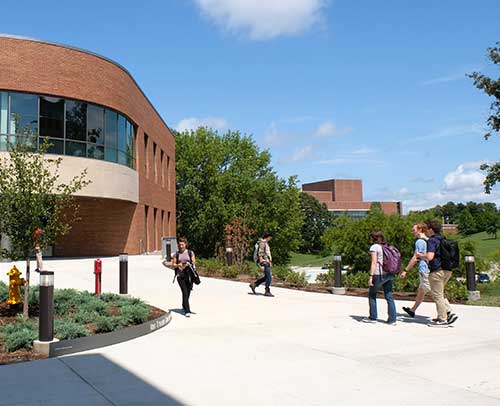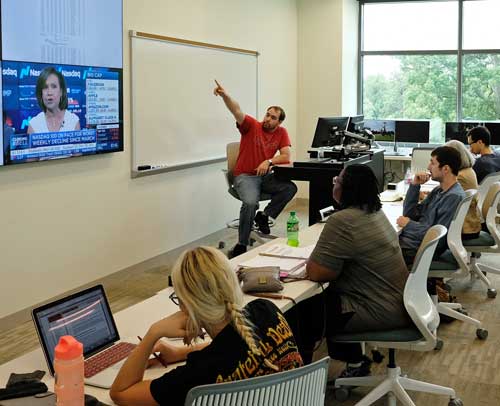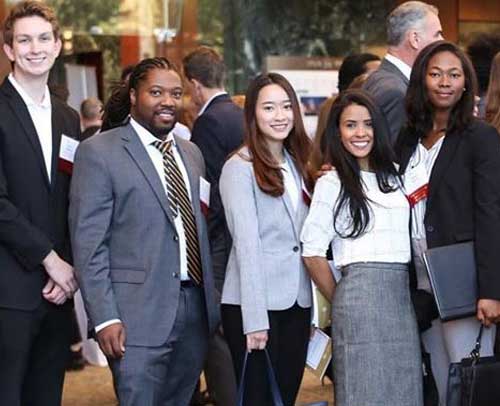Advance your career with a master’s in fintech from UMSL
The financial sector is evolving rapidly, necessitating a higher degree and expertise in emerging financial technologies. UMSL offers a customizable STEM-designated Master’s in Fintech, covering areas like blockchain, AI, mobile payments and robo-advising. Electives include investments, real estate, financial markets, venture capital and international finance. Graduates are well-equipped for the dynamic fintech industry, ready to tackle roles in financial technology.
Why should you pursue a master’s degree in fintech?
It’s no secret that well-trained fintech professionals are in high demand. Financial institutions have been heavily investing in modernizing their infrastructure, incorporating big-data analytics, artificial intelligence, machine learning and other fintech tools into their operations.
Fintech delivers innovative solutions to the financial services industry. Demand for skilled fintech professionals is soaring as financial institutions update their infrastructures with technologies like big-data analytics and AI. Meanwhile, leading fintech companies like Venmo, Square and PayPal innovate by creating new products for underserved markets. The growth in fintech use and application enhances job opportunities, as firms require experts to implement these technologies.
Want more information?
Join UMSL Graduate Business for an informative one-hour information session. Explore our graduate programs, get your questions answered and discover why UMSL is the right choice for you.
Register for an Info Session
Program type:
Graduate, MS
Format:
100% Online, Hybrid
Take the next step
Request more information below:

Why Earn Your Degree in Fintech at UMSL?
UMSL’s internationally recognized College of Business Administration is ranked among the top two percent of business schools worldwide thanks to our dual AACSB accreditation in both business and accounting. Our fintech master’s degree program will provide you with a comprehensive skillset the industry demands through:
- Experiential learning opportunities. As you complete courses online, we’ll provide you with a license to use the Refinitiv Workspace platform, access to a trading room on campus that’s equipped with a state-of-the-art computing system and real-time financial data, internships through partnerships with many financial institutions and more.
- Expert instructors. Take fintech courses online with highly qualified educators and researchers who hold terminal degrees from the world’s most prestigious institutions and bridge the classroom with the real world.
- Fintech courses online. Complete coursework for this flexible online fintech master’s degree regardless of where you live and work.
What can you do with a master’s degree in fintech?
As the field continues to rapidly grow, so, too, will the variety of jobs in fintech — and a master’s in fintech from UMSL can help you break into the industry and build a lasting career.
For example, according to the U.S. Bureau of Labor Statistics, the need for financial analysts will steadily grow over the next decade, adding an average of 31,900 jobs in fintech each year with a median annual salary of $96,220 per year. Should you be interested in becoming a financial manager, this need is expected to grow by 8% over the next decade, according to the BLS, adding an estimated 123,100 jobs in fintech each year with a median annual salary of $139,790.
The finance industry is being transformed by fintech, enhancing efficiency, reducing costs and improving security. This growth not only promises lucrative careers in traditional financial settings but also in non-financial corporate sectors and startups. The MS in Fintech at UMSL is designed to prepare graduates for a range of roles across financial institutions, corporate environments and innovative fintech startups.
$139,790
8
Career Opportunities
- Algorithmic Trader/High Frequency Trader
- Blockchain Developer
- Compliance Expert
- Cybersecurity Analyst
- Digital Payment Specialist
- Financial App Developer
- Financial Data Analyst/Data Scientist
- Financial Planner
- Financial Product Manager
- Quantitative Analyst (Quant)
- Robo-Advisor Specialist
- Smart Contract Engineer
Admission to the FinTech program requires an undergraduate business degree or another discipline and meeting the prerequisites for the introductory Financial Management Course (FIN 6500).
Admission Requirements
Graduate Business Programs takes a holistic approach when evaluating student applications. Grade point average (GPA), letters of recommendation and professional experience are all considered when making an admissions decision. The GMAT is not required for admission to this program.
Applicants with a 3.0 GPA or higher (on a 4.0 scale) qualify for regular admission. Students may be admitted on a restricted status if their GPA is slightly below 3.0.
For more information on applying to a Graduate Business program, please review the College's Admissions Standards page.
Application Deadlines
Fall semester: July 1
Spring semester: December 1
Summer semester: May 1
Plan of study
Review Full Degree Requirements
Non-Missouri Residents: Prospective students are responsible for reviewing the UMSL state authorizations page to see if this program is offered in their state throughout their program and to review the licensure or certification requirements for the state in which they reside.
Career Services – Students have access to professional career counselors who can assist in everything from resume development and interview preparation to lining up an internship or connecting you with your next fulltime career. UMSL alumni also enjoy high quality, lifelong career management programming, services, events and resources to assist in all phases of career development.
Networking – with the largest alumni network in the region, UMSL graduate students have access to leading professionals engaged in business, research, entrepreneurship, non-profit, government, community organizations. Our academic units engage this network in curriculum development to ensure our graduate students gain the skills needed to advance along their choose career path.








